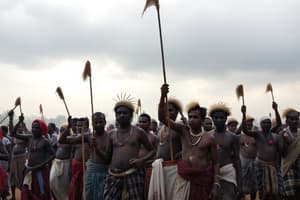Podcast
Questions and Answers
What miraculous powers were attributed to Birsa?
What miraculous powers were attributed to Birsa?
- Curing all diseases and multiplying grain (correct)
- Flying and disappearing at will
- Controlling the weather and summoning animals
- Speaking to spirits and predicting the future
What was the main purpose of Birsa as declared by himself?
What was the main purpose of Birsa as declared by himself?
- To save his people from trouble and free them from the slavery of outsiders (correct)
- To accumulate wealth and power for himself
- To conquer new territories and expand his influence
- To establish a new religious order and rituals
Which tribal groups were among the followers of Birsa?
Which tribal groups were among the followers of Birsa?
- Bodos, Kukis, and Karbis
- Mundas, Santhals, and Oraons (correct)
- Bhils, Gonds, and Gujjars
- Nagas, Khasis, and Garos
What were the main concerns of the tribals under British rule?
What were the main concerns of the tribals under British rule?
Who did the tribals refer to as 'dikus' or outsiders?
Who did the tribals refer to as 'dikus' or outsiders?
What was the main reason for Birsa to gather followers?
What was the main reason for Birsa to gather followers?
Who did the tribals refer to as 'dikus' or outsiders?
Who did the tribals refer to as 'dikus' or outsiders?
What was the common concern of the tribals under British rule?
What was the common concern of the tribals under British rule?
What was the belief of Birsa's followers about him?
What was the belief of Birsa's followers about him?
What miraculous powers were attributed to Birsa?
What miraculous powers were attributed to Birsa?
Flashcards are hidden until you start studying
Study Notes
Miraculous Powers of Birsa
- Birsa Munda was believed to have supernatural abilities, including the power to heal diseases and control nature.
- His followers regarded him as a divine figure, attributing miracles to him that reinforced their faith and allegiance.
Main Purpose Declared by Birsa
- Birsa aimed to liberate the tribal people from oppressive British rule and restore their rights over land and culture.
- He envisioned a society where tribes could live freely and maintain their traditional practices.
Tribal Groups Among His Followers
- Various tribal communities, including the Munda and Oraon, rallied behind Birsa during the independence movement.
- His message resonated with many marginalized groups who shared similar grievances against colonial policies.
Concerns of Tribals Under British Rule
- Tribals faced displacement from their ancestral lands due to British land acquisition policies.
- There were rampant exploitation, economic hardship, and loss of traditional livelihoods, leading to social unrest among tribal populations.
'Dikus' or Outsiders
- The term 'dikus' referred to non-tribal people, particularly British authorities and moneylenders, who exploited tribal resources.
- This label represented the growing resentment among tribals toward outsiders encroaching on their lives and lands.
Main Reason for Birsa to Gather Followers
- Birsa mobilized followers to unite against injustices and advocate for the rights of the tribal communities.
- His intent was to strengthen the tribe's collective identity and foster a sense of purpose in resisting colonial oppression.
Belief of Birsa's Followers
- His followers viewed Birsa not just as a leader but as a messianic figure destined to bring change and justice to the oppressed.
- Many believed that Birsa had been chosen by divine powers to deliver them from exploitation and restore their dignity.
Studying That Suits You
Use AI to generate personalized quizzes and flashcards to suit your learning preferences.



